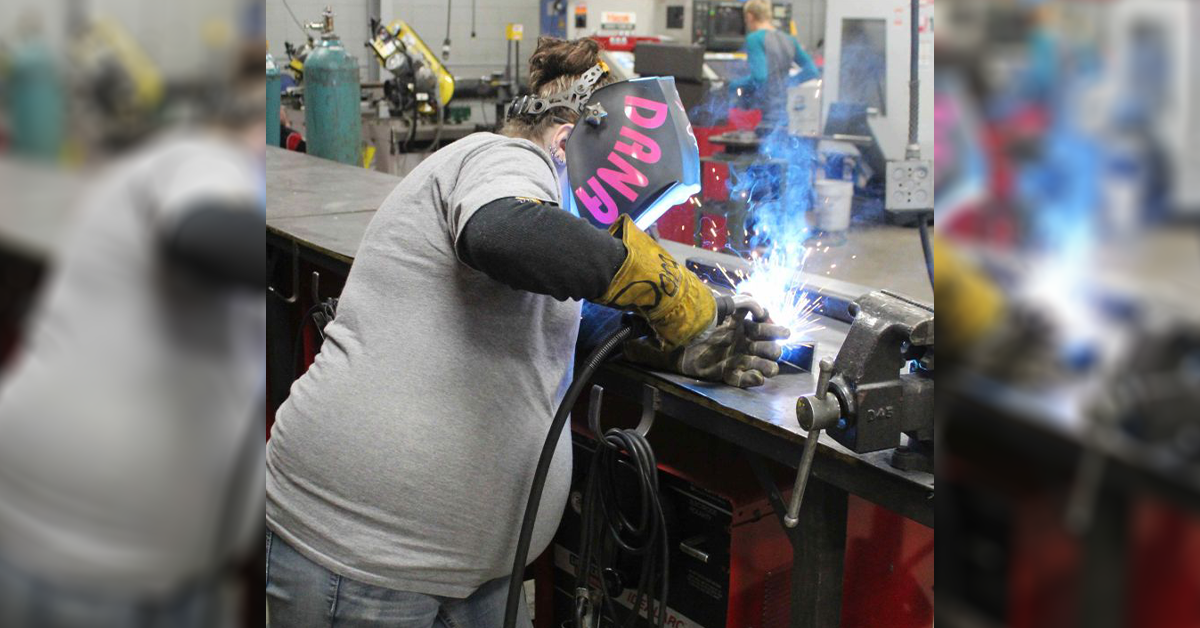How welding impacts your pregnancy or likelihood of becoming pregnant
One of Carmen Electrode’s most frequently asked questions is, “Can I weld while pregnant? If so, what additional safety precautions should I take?” While we highly recommend contacting your primary care physician for health related questions, we also wanted to share our preliminary research on what steps to take toward a safer welding experience.
Practicing safe welding techniques and wearing the proper gear is important at any stage of life, in any shop, and for every welding job ever. But for pregnant women or couples who are looking to become pregnant, the need to follow safety guidelines increases greatly.
BREATHE IN BREATHE OUT
A study released by the US National Library of Medicine for the National Institutes of Health shows that women who are exposed to welding and metal dust fumes may be at risk for preterm delivery, low birth weight and small-for-gestational age. Additionally, men who are exposed to the same fumes increase the risk for their partner to experience the same outcomes during pregnancy.
“The present results provide evidence that maternal exposure to welding fumes or metal dusts/fumes combination during pregnancy may reduce fetal growth and suggestive evidence that paternal exposure to welding fumes may increase the risk of preterm delivery and small-for-gestational age.”
This study shows that fumes play the biggest role in pregnancy complications. One of the best ways to reduce breathing in fumes and working in poor air quality conditions is with a good respirator, such as half mask, powered air purifying respirators and supplied air helmets.
If you’re in the market for protective gear, Arc-Zone.com® offers 3M™ and Miller® Welders’ half mask respirators and variations of disposable respirators. If a half mask respirator doesn’t calm your nerves regarding welding safety and pregnancy, Arc-Zone® also carries powered air-purifying respirators and supplied-air helmets with auto darkening lenses and adjustable head suspension.
STAY THIRSTY, MY FRIENDS
This is more for women that are already pregnant, but this advice could really go for everyone, as it’s no surprise that you get hot while welding.
You’re melting metal and wearing layers of thick protective gear for hours each day which is why the Occupational Safety and Health Administration suggests drinking between 4-8 ounces of water every 15 minutes. You might’ve heard about drinking at least 8 cups of water throughout the day, but with the risk of heat stress on the body, there is a strict time limit.
When it comes to pregnant women and dehydration, that is on a whole other level.
According to American Pregnancy Association, “Water plays an important role in the healthy development of your baby such as helping to form the placenta, which is what your baby relies on to receive nutrients during pregnancy. Water is also used to form the amniotic sac later in your pregnancy. Therefore, it is important to avoid dehydration during pregnancy.”
UNTIL NEXT TIME
To all the ladies that took an interest in this blog, we applaud you for wanting a safe and healthy pregnancy. We are also stoked to see so many of you continuing with your careers or hobbies throughout a life changing moment. It’s good to keep a piece of yourself, not only for you but to pass on that sweet little skill when your kiddos are older.
References
[1] US National Library of Medicine. (2009). Paternal and Maternal Exposure to Welding Fumes and Metal Dusts or Fumes and Adverse Pregnancy Outcomes. [NCBI.NLM.NIH.gov online article]. Retrieved on 12/18/2017 from https://www.ncbi.nlm.nih.gov/pubmed/18820944
[2] American Pregnancy Association. (n.d.). Dehydration During Pregnancy. [AmericanPregnancy.org online article]. Retrieved on 06/13/2020 from https://americanpregnancy.org/pregnancy-complications/dehydration-pregnancy/#:~:text=Dehydration%20during%20pregnancy%20can%20lead,nutritional%20support%20for%20your%20baby.
[3] Occupational Health and Safety Adminstration. (n.d.). Heat Stress. [OSHA.gov online article]. Retrieved on 06/13/20 from https://www.osha.gov/dts/maritime/sltc/ships/shipfitting/heatstress.html
